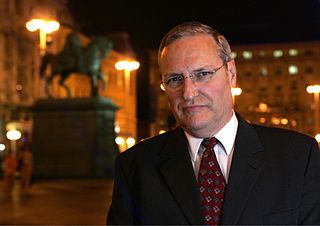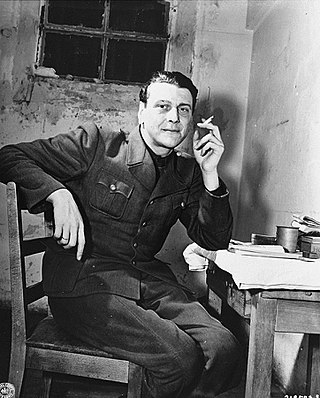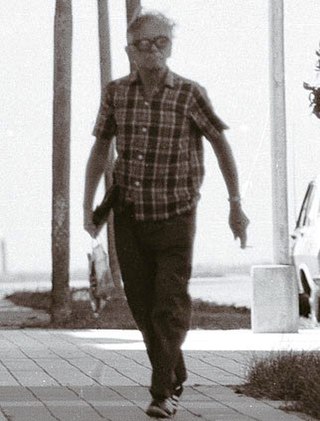
Frederick McCarthy Forsyth is an English novelist and journalist. He is best known for thrillers such as The Day of the Jackal, The Odessa File, The Fourth Protocol, The Dogs of War, The Devil's Alternative, The Fist of God, Icon, The Veteran, Avenger, The Afghan, The Cobra and The Kill List.

Alois Brunner was an Austrian officer who held the rank of SS-Hauptsturmführer (captain) during World War II. Brunner played a significant role in the implementation of the Holocaust through rounding up and deporting Jews in occupied Austria, Greece, Macedonia, France, and Slovakia. He was known as Final Solution architect Adolf Eichmann's right-hand man.
ODESSA is an American codename coined in 1946 to cover Nazi underground escape-plans made at the end of World War II by a group of SS officers with the aim of facilitating secret escape routes, and any directly ensuing arrangements. The concept of the existence of an actual ODESSA organisation has circulated widely in fictional spy novels and movies, including Frederick Forsyth's best-selling 1972 thriller The Odessa File. The escape-routes have become known as "ratlines". Known goals of elements within the SS included allowing SS members to escape to Argentina or to the Middle East under false passports.

Guy Edward Barham Walters is a British author, historian, and journalist. He is the author and editor of nine books on the Second World War, including war thrillers, and a historical analysis of the Berlin Olympic Games.

Ratlines were systems of escape routes for German Nazis and other fascists fleeing Europe from 1945 onwards in the aftermath of World War II. These escape routes mainly led toward havens in Latin America, particularly in Argentina, though also in Paraguay, Colombia, Brazil, Uruguay, Mexico, Chile, Peru, Guatemala, Ecuador and Bolivia, as well as the United States, Spain and Switzerland.
A Nazi hunter is an individual who tracks down and gathers information on alleged former Nazis, or SS members, and Nazi collaborators who were involved in the Holocaust, typically for use at trial on charges of war crimes and crimes against humanity. Prominent Nazi hunters include Simon Wiesenthal, Tuviah Friedman, Serge Klarsfeld, Beate Klarsfeld, Ian Sayer, Yaron Svoray, Elliot Welles, and Efraim Zuroff.

The Odessa File is a thriller by English writer Frederick Forsyth, first published in 1972, about the adventures of a young German reporter attempting to discover the location of a former SS concentration-camp commander.

Simon Wiesenthal was a Jewish Austrian Holocaust survivor, Nazi hunter, and writer. He studied architecture and was living in Lwów at the outbreak of World War II. He survived the Janowska concentration camp, the Kraków-Płaszów concentration camp, the Gross-Rosen concentration camp, a death march to Chemnitz, Buchenwald, and the Mauthausen concentration camp.

Efraim Zuroff is an American-born Israeli historian and Nazi hunter who has played a key role in bringing indicted Nazi and fascist war criminals to trial. Zuroff, the director of the Simon Wiesenthal Center office in Jerusalem, is the coordinator of Nazi war crimes research worldwide for the Wiesenthal Center and the author of its annual "Status Report" on the worldwide investigation and prosecution of Nazi war criminals which includes a list of most-wanted Nazi war criminals.

Eduard Roschmann was an Austrian Nazi SS-Obersturmführer and commandant of the Riga Ghetto during 1943. He was responsible for numerous murders and other atrocities. As a result of a fictionalized portrayal in the novel The Odessa File by Frederick Forsyth and its subsequent film adaptation, Roschmann came to be known as the "Butcher of Riga".

Eli M. Rosenbaum is an American lawyer and the former Director of the United States Department of Justice, Office of Special Investigations (OSI), which was primarily responsible for identifying, denaturalizing, and deporting Nazi war criminals, from 1994 to 2010, when OSI was merged into the new Human Rights and Special Prosecutions Section. He is now the Director of Human Rights Enforcement Strategy and Policy in that section. He has been termed a "legendary Nazi hunter."

The Odessa File is an 1974 thriller film, adapted from the 1972 novel of the same name by Frederick Forsyth, about a reporter's investigation of a neo-Nazi political-industrial network in post-Second World War West Germany. The film stars Jon Voight, Mary Tamm, Maximilian Schell and Maria Schell and was directed by Ronald Neame, with a score by Andrew Lloyd Webber. It was the only film that the Schell siblings made together.

Altaussee is a municipality and spa town in the district of Liezen in Styria, Austria. The small village is nestled on the shores of the Lake Altaussee, beneath the Loser Plateau. Occupying an area of 92 km², Altaussee is home to 1,777 people. The municipality includes two cadastral communities: Altaussee and Lupitsch. The designated climatic spa is within the Salzkammergut region. Altaussee has the biggest salt deposits of Austria, which are still mined today.

The following is a bibliography of works devoted to the Nuremberg Trials.
Erna Wallisch allegedly was a female guard in two Nazi concentration camps, but despite several trials was never convicted. In 2007, she was seventh on the Simon Wiesenthal Center's list of most wanted war criminals that had never been convicted.

Die Spinne was a post-World War II organization thought to have helped certain Nazi war criminals escape justice. Its existence is still debated today. It is believed by some historians to be a different name, or a branch, of ODESSA, an organization established during the collapse of Nazi Germany, similar to Kameradenwerk, and der Bruderschaft, devoted to helping German war criminals flee Europe. It was led in part by Otto Skorzeny, Hitler's commando chief, as well as Nazi intelligence officer Reinhard Gehlen. Die Spinne helped as many as 600 former SS men escape from Germany to Francoist Spain, Juan Peron's Argentina, Paraguay, Chile, Bolivia, the Middle East, and other countries.

Aribert Ferdinand Heim, also known as Dr. Death and Butcher of Mauthausen, was an Austrian Schutzstaffel (SS) doctor. During World War II, he served at the Mauthausen-Gusen concentration camp in Mauthausen, killing and torturing inmates using various methods, such as the direct injection of toxic compounds into the hearts of his victims.

The Jewish Historical Documentation Centre was an office headed by Simon Wiesenthal in Linz. The centre collected and promulgated information about war crimes, specific mainly to crimes against the Jewish people as perpetrated by Nazi Germany in Europe during the Second World War.

László Csizsik Csatáry was a Hungarian citizen and an alleged Nazi war criminal, convicted and sentenced to death in absentia in 1948 by a Czechoslovak court. In 2012, his name was added to the Simon Wiesenthal Center's list of most wanted Nazi war criminals.

Walter Kutschmann was a German SS-Untersturmführer and Gestapo officer, a member of an Einsatzkommando, based first in Lwów, Poland, and later in Drohobycz. He was responsible for the massacre of 1,500 Polish Jews in Lwów, Poland, in the years 1941–42.

















